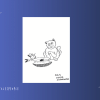'Seven': Sehri Tales selections, Day 24

I.
Crossing the Gates of Heaven
We were a family of seven. As I see the soul of Meu fleeting in thin air due to lack of an ounce of bread, I think of all the ways my complaints will take flight to the arsh of Allah.
Gate 1: 'Ya Rabb, some people rained firecrackers on us which we used to lit for celebrating Eid, except, those cracked and took away my brother, Mohammad.'
Gate 2: 'Ya Rabb, my sweet sister Fatima couldn't speak since birth. But they still tied her mouth to silence her scream.'
Gate 3: 'Ya Rabb, my father never missed a prayer. But the bullet hit him before his forehead hit the ground for sujood.'
Gate 4: 'Ya Rabb, my mother never showed her face but they took away her hijab and humiliated her until she was welcomed by heaven.'
Gate 5: 'Ya Rabb, my unborn brother melted away from my mother's womb like a molten lava.'
Gate 6: 'Ya Rabb, Meu used to wig her tail before sleeping on my lap but now, she's forever asleep.'
But as I cross the final gate 7, I can't help but say, 'Ya Rabb, please wash away all our sins, including theirs' because what if they are also a family of seven.?
by Samanta Islam Sayma
II.
It was seven o'clock when I put down the final piece of half-eaten chicken wings and washed everything down with lemon tea. Everything tasted heavenly, heartily dipped in Ramadan-induced gluttony. I licked the sauce off my spice-stained fingers and looked down at all the food that awaited their intended destination - my belly.
It was seven o'clock when I started feeling sick, having gorged on every sinfully decadent dish on the buffet. I couldn't bear to even look at the food anymore, despite wanting to chow down harder. I averted my eyes from the table, and looked down into the empty streets outside the window.
It was seven o'clock when I saw a man get thrown a packet of muri from one of the waiters. He ate with more fervor than me.
At seven o'clock, I felt my insides revolt. My stomach churned and squeezed. My ribs turned brittle. My eyes pressed shut.
At seven o'clock, I realized it wasn't just the streets that were empty, but also mouths, hands and stomachs. And soon enough, I was too.
At seven o'clock, I spilled my belly onto the table. The wings were still undigested, the rice grains slathered in a mixture of bile and saliva. The kebabs had become mush.
It is no longer seven o'clock, but I am still empty. And I wonder if that man is too.
by Rafid Khandaker
III.
Detective Mozammel rubbed his bleary eyes as he entered the seventh crime scene of the month. Something was not adding up.
Another victim turned up every seven days like clockwork. Each had been found exactly one week after the last. All the deaths seemed random to everyone. Until Mozammel noticed the clues.
He scanned the body positioned on the floor, arms forming a 7. A single playing card–the seven of clubs–rested on the chest. Subtle, but he was sure it meant something.
His team had come up blank so far. No witnesses, no leads. It's just a psychopath taunting the police—a week to solve the case before the next strike.
In the other cases, Mozammel had discerned clues directly referring to the number seven. Notes written in sevens. Seven drops of blood. But this scene provided no immediate answers.
Exasperated and frustrated, Mozammel returned to the station and pored over case files repeatedly until dawn. Something was there, he knew, just below the surface. Some clues to crack this sadistic pattern.
Back at the latest crime scene under morning light, Mozammel noticed something peculiar. Scratch marks on the floor, as if from dragging, led into shadows. He followed their sly trail behind an armoire.
There, scrawled in what looked like aged blood, a cryptic message: "Tick tock, the hours vanish quicker when the game's afoot. Solve if you are able, detective. The next move is yours. But time is running out like grains of sand in the glass."
by Nahid Hassan

 For all latest news, follow The Daily Star's Google News channel.
For all latest news, follow The Daily Star's Google News channel. 







Comments